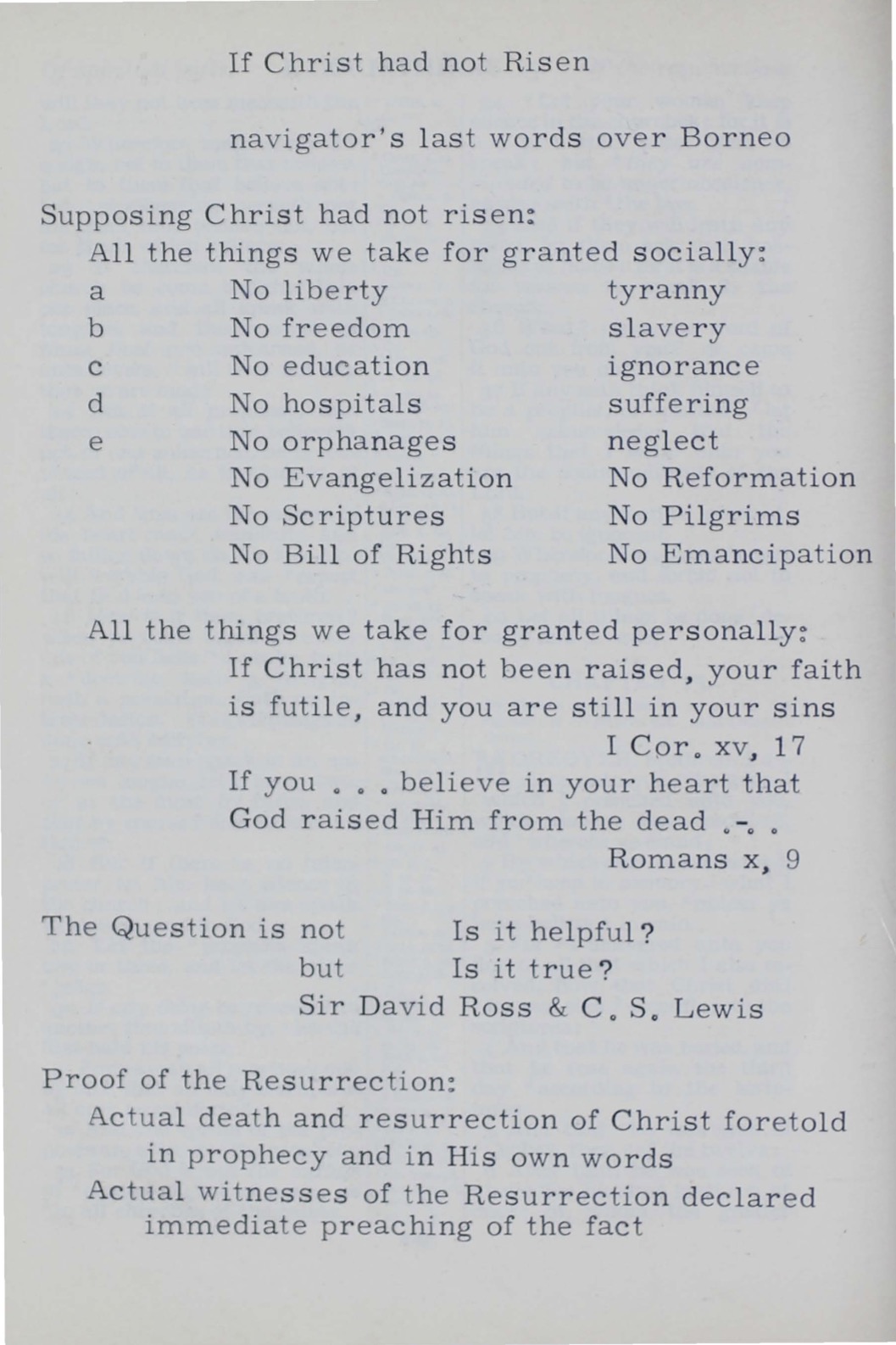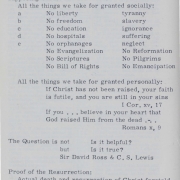Who Are You Calling a Liar? – 1 John 5:10 – March 30 2021
/0 Comments/in Enduring Words for Troubled Times/by David GuzikA Rushing Mighty Wind – Acts 2:2-4a – March 29 2021
/0 Comments/in Enduring Words for Troubled Times/by David GuzikIf Christ Had Not Risen
/0 Comments/in For Pastors, Preachers, Bible Teachers/by David GuzikDear Pastor, Preacher, or Bible Teacher –
Happy Monday to you! I know that this will be a busy week for you, and maybe stressful. I want you to know that I am praying for you this week, asking God to bring special wisdom, grace, strength, and spiritual power to every servant of His that reads this!
I am praying that Ephesians 1:17-20 will be real in your life and ministry this week:
that the God of our Lord Jesus Christ, the Father of glory,
may give to you the spirit of wisdom and revelation in the knowledge of Him,
the eyes of your understanding being enlightened;
that you may know what is the hope of His calling,
what are the riches of the glory of His inheritance in the saints,
and what is the exceeding greatness of His power toward us who believe,
according to the working of His mighty power
which He worked in Christ when He raised Him from the dead
and seated Him at His right hand in the heavenly places,
Here is a special bonus. A few years ago a received a very special Bible. It was one of the preaching Bibles of a great man of God named J. Edwin Orr. Dr. Orr had this Bible specially bound with preaching notes in it. So, below are notes that he used to preach on the resurrection of Jesus from 1 Corinthians 15. Maybe it might stir your mind for a thought or two this week!

Blessings to you in Jesus’ Name – David Guzik
Click Here to Receive Email from David for Pastors, Preachers, and Bible Teachers
No Other Name
/0 Comments/in Weekly Devotional/by David GuzikNor is there salvation in any other, for there is no other name under heaven given among men by which we must be saved. (Acts 4:12)
Here was bold preaching from Peter. He spoke to the most powerful men of his community and told them that Jesus Christ was the only way to salvation, the only way to be made right with God.

This shows what a remarkable transformation the Holy Spirit did in Peter. The same man who only a few weeks before was afraid to say that he even knew Jesus now proclaimed Jesus Christ as the only way to be made right with God. As he was filled with the Holy Spirit (Acts 4:8), Peter did not have the spirit of fear – he had the spirit of power, love, and a sound mind. (2 Timothy 1:7).
Inspired by the Holy Spirit, Peter phrased this with great emphasis:
– There is no salvation in any other name than Jesus (Nor is there salvation in any other)
– There is absolutely no other name that can save (for there is no other name under heaven given among men)
– This is a “must” for salvation, being made right with God (by which we must be saved)
Peter didn’t merely proclaim Jesus as a way of salvation, but as the only way of salvation. The idea that there is no salvation in any other, and that there is no other name under heaven given among men by which we must be saved is hard to accept for many people – but it is plainly stated.
The world hates this kind of talk. Many people don’t mind if you speak about Jesus being one among many possible saviors or ways to God. But if you believe and speak what the Bible says – that there is no salvation in any other – then get ready to be laughed at, to be hated, to be considered hateful.
Instinctively, many respond: “Isn’t there some way that I can save myself? Isn’t Jesus just for those people who can’t save themselves?” No. If you are going to be rescued; if you are going to be made right with God, Jesus is going to do it.
Such a strong statement from Peter also shows that he understood that Jesus was in fact God. The Old Testament clearly says that God is the only Savior (Isaiah 43:11, 45:21). If Jesus is the only savior, then Jesus is God!
If you wish to believe that everyone will be saved, or that there are many roads to heaven, or that one can take the best of all faiths and blend them into one – you are free to believe such things. You may believe such things and bear the consequences; but please do not claim this is the teaching of the Bible.
Today, remember what the Bible says about the name of Jesus: there is no other name under heaven given among men by which we must be saved.
La cabeza del ángulo
/0 Comments/in Devocional Semanal/by David GuzikSea notorio a todos vosotros, y a todo el pueblo de Israel, que en el nombre de Jesucristo de Nazaret, a quien vosotros crucificasteis y a quien Dios resucitó de los muertos, por él este hombre está en vuestra presencia sano. Este Jesús es la piedra reprobada por vosotros los edificadores, la cual ha venido a ser cabeza del ángulo (Hechos 4:10-11).
Pedro predicó a los líderes religiosos de Jerusalén, les habló con valentía de Jesucristo. Al hacerlo, tomó palabras del Salmo 118: 22 y las aplicó a Jesús. Pedro les dijo que aunque Jesús fue rechazado por los hombres – por esos líderes – aún así fue exaltado por Dios el Padre.

Esta cita del Salmo 118:22 tiene un lugar especial en la Biblia. Es una declaración fuerte e importante en la comprensión del Nuevo Testamento de la persona y obra de Jesús. Jesús citó esto sobre sí mismo en Mateo 21:42, Marcos 12:10-11 y Lucas 20:17. Pedro lo citó aquí en Hechos 4:11. Pablo aludió a este versículo en Efesios 2:20, y Pedro nuevamente se refirió a él en 1 Pedro 2:7-8. Ningún texto del Antiguo Testamento se cita más en el Nuevo Testamento.
El principio de que el rechazado se convierte en el principal de todos se encuentra en muchos personajes de la Biblia. Fue cierto en el caso de Jacob, José y David: cada uno fue rechazado y luego elevado. Ciertamente fue cierto en el caso de Jesús.
– No aprobaron Su origen (Juan 7:52).
– No aprobaron su falta de educación formal (Juan 7:15).
– No aprobaron su indiferencia por las tradiciones religiosas (Lucas 6: 2).
– No aprobaron su elección de amigos (Mateo 9:11).
Sin embargo, Jesús ha venido a ser cabeza del ángulo. Vemos que aunque los líderes religiosos (los edificadores) de su época lo rechazaron, Dios estableció a Jesús como la cabeza del ángulo principal de su gran plan de las edades, que todas las cosas serían fundadas y cumplidas en él.
Note que esto fue obra de Dios – Dios lo resucitó de los muertos . La exaltación de Jesús, desde la cruz hasta la resurrección a la diestra de Dios en las alturas, es únicamente obra de Dios. ¿Quién volvió a elevar a Jesús, exaltándolo sobre todo?
– No los líderes religiosos – ellos lo rechazaron.
– No los líderes romanos – ellos lo crucificaron.
– No las multitudes judías – ellos eligieron a otro.
– No los discípulos – ellos se encogieron de miedo.
– No sus seguidores influyentes – ellos lo enterraron.
– No las mujeres devotas – ellas fueron aquejadas por el dolor.
– Solo Dios el Padre mismo podía elevar a Jesús.
Y lo hizo – Dios el Padre elevó a Jesús en alto cuando lo resucitó de los muertos. No podemos elevar a Jesús más alto de lo que lo ha hecho el Padre, pero podemos reconocer al Jesús exaltado y honrarlo como se merece.
Una cabeza de ángulo es algo sobre lo que construir. Toda la obra de Dios a través de la creación es edificada sobre Jesucristo. Él es la base sólida e inquebrantable de tu vida. Lo que sea que edifiques hoy, edifícalo sobre la base de Jesucristo –la cabeza del ángulo principal.
Der Eckstein
/0 Comments/in Wöchentliche Andacht/by David GuzikSo sei euch allen und dem ganzen Volk Israel bekanntgemacht, daß durch den Namen Jesu Christi, des Nazareners, den ihr gekreuzigt habt, den Gott auferweckt hat aus den Toten, daß dieser durch Ihngesund vor euch steht. Das ist der Stein, der von euch, den Bauleuten, verworfen wurde, der zum Eckstein geworden ist. (Apostelgeschichte 4,10-11)
Petrus predigte zu den religiösen Führern Jerusalems und erzählte ihnen mutig von Jesus Christus. Dabei nahm er Worte aus Psalm 118,22 und wendete sie auf Jesus an. Er sagte ihnen, dass auch wenn Jesus von den Menschen – von ihnen – abgelehnt wurde, Er doch von Gott, dem Vater, erhöht war.

Dieses Zitat aus Psalm 118,22 hat eine besondere Stellung in der Bibel. Es ist eine starke und wichtige Aussage im Neuen Testament über die Person und das Werk Jesu. Jesus spricht selbst davon in Matthäus 21,42; Markus 12,10-11 und Lukas 20,17. Petrus zitiert das hier in Apostelgeschichte 4,11. Paulus wies auf diesen Vers in Epheser 2,20 hin, und Petrus bezieht sich noch einmal darauf in 1. Petrus 2,7-8. Kein Text im Alten Testament wird häufiger im Neuen Testament zitiert.
Das Prinzip, dass der Eine, der abgelehnt wurde, zum Eckstein wird, findet sich bei vielen biblischen Charakteren. Es traf auf Jakob, Josef und David zu – jeder von ihnen wurde zuerst abgelehnt und dann erhöht. Ganz sicher galt das für Jesus.
- Sie billigten seine Herkunft nicht (Johannes 7,52)
- Sie billigten seinen Mangel an Schulbildung nicht (Johannes 7,15)
- Sie billigten nicht, dass er religiöse Traditionen missachtete (Lukas 6,2)
- Sie billigten die Wahl Seiner Freunde nicht (Matthäus 9,11)
Doch Jesus wurde zum Eckstein, auch wenn die religiösen Führer (die Bauleute) Ihn verwarfen. Gott setzte Jesus als Eckstein für Seinen großen Plan für die Ewigkeit, dass alle Dinge in Ihm gegründet und erfüllt werden.
Bemerke, dass das etwas ist, das Gott tut – den Gott auferweckt hat. Die Erhebung Jesu vom Kreuz zur Auferstehung zur rechten Hand Gottes ist allein Gottes Werk. Wer hat Jesus erhöht und über alles gesetzt?
- nicht die religiösen Führer – sie lehnten Ihn ab
- nicht die Römischen Führer – sie kreuzigten Ihn
- nicht die Juden – sie wählten einander
- nicht die einflussreichen Nachfolger – sie beerdigten Ihn
- nicht die hingegebenen Frauen – sie trauerten
- Nur Gott, der Vater selber, konnte Jesus erhöhen
Und das tat Er – Gott, der Vater, erhöhte Jesus, als Er Ihn auferweckt hat von den Toten. Wir können Jesus nicht weiter erhöhen, als der Vater es tat, aber wir können den erhöhten Jesus anerkennen und Ihm die Ehre geben, die Er verdient.





